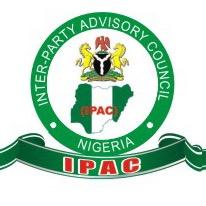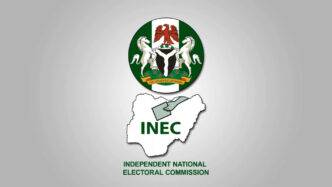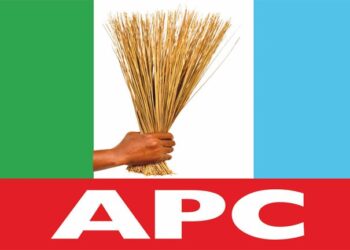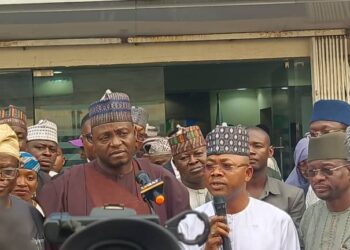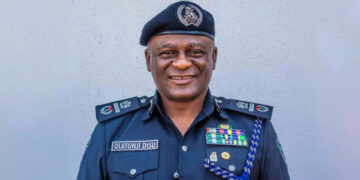By Clifford Ndujihe/ Omeiza Ajayi, LAGOS
Ahead of next year’s general election, the 18 registered political parties in Nigeria have called out the state governors, accusing them of trying to sabotage the electoral process by stifling the opposition in their various states.
Also, a rights lawyer, Mr Femi Falana, SAN, asked security agencies to arrest and prosecute those he claimed are “anti-democratic forces” bent on truncating the 2023 elections.
This came as Independent National Electoral Commission (INEC), security and anti-graft agencies decried the high cost of politics in Nigeria and the ruinous influence of money on the nation’s democracy.
The outcries were a fallout of a “Stakeholders’ Summit on Addressing the Influence of Money in the 2023 General Elections” held on Monday in Abuja
Some of the stakeholders at the event were the INEC Chairman, Professor Mahmood Yakubu; Inspector-General of Police, IGP, Usman Baba Alkali; Chairman of the Independent Corrupt Practices Commission, ICPC, Professor Bolaji Owasanoye, SAN; and Chairman, Economic and Financial Crimes Commission, EFCC, Mr. Abdulrasheed Bawa
Others were Director-General of the National Broadcasting Commission, Director-General, Advertising Regulatory Council of Nigeria, Director-General, National Financial Intelligence Unit, Chairman , Inter-Party Advisory Council, INEC National Commissioners; representatives of various security and safety agencies; Chairman, Broadcasting Organisation of Nigeria, Chairman Newspapers Proprietors Association of Nigeria, President, Nigeria Union of Journalists, representatives of financial institutions and leaders of civil society organisations, CSOs.
Speaking on behalf of the 18 registered political parties, Chairman of IPAC, Yabagi Sani, accused state governors of preventing the opposition from selling their manifestos to the populace in the states.
Sani noted that if the use of money was allowed a free rein in the elections, there is no guarantee that elections would be credible, transparent, acceptable and rancour-free.
He said in the countdown to the 2023 elections, IPAC and a broad spectrum of concerned stakeholders had observed that if urgent and drastic steps were not taken, the elections would not be free, fair and credible due to the negative influence of money in the electoral process.
“This palpable apprehension is derived from the emerging trend in the actions and utterances of chieftains of some candidates, who clearly are more powerful than the leadership of the political parties.
This is evident right from the stage of the primary elections of the political parties and at campaign rallies over reports of the plans to deploy huge, illegitimate sums of money to influence the outcome of the elections.
“All factors considered, the nation will be at a crucial crossroads in its political history in 2023.
“The stakes are high because we have candidates who in their desperation to clinch power or to wrest it will go to any length disregarding sanity and the law in their bid to have their way.
“More than any other experience of elections that we have had, the 2023 elections come with a demand that all care and precaution must be taken in order to avoid rocking the boat of democracy.
“Section 91(4) of the act states that no registered political party in Nigeria, its aspirants or candidate should be prevented from holding rallies, processions or meetings at any time for political purposes.
“Governors are, however, stopping opposition parties from campaigning by imposing prohibitive fees for access to campaign venues, placing of campaign posters and erection of bill boards. This is happening in many states as I speak here.
“These undemocratic and illegal actions by elected state actors create a situation where use of money and incumbency factors are used to subvert the wishes of the electorate,” he stated.
Speaking at the event, Prof. Yakubu decried the negative role of money in elections as its wrong deployment destroys the very basis of democratic elections, which is that citizens should freely choose those who exercise power on their behalf.
“It renders the emergence of the right candidates for positions extremely difficult, undermines fair electoral adjudication, and destroys the professional and independent conduct of INEC officials and other public agencies involved in elections.
“Even more worrisome is the high prospect that criminal money may find its way into our elections through money laundering.
“Above all, the pernicious use of money tremendously increases the likelihood of election violence due to a ‘win at all costs’ mentality among contestants, who would have invested a fortune in election.
“Surely, election is not a business venture for profit. Instead, it is an application to serve the people with the understanding that they may prefer someone else on one occasion.
“But then, there would be an opportunity to reapply after four years. Citizens’ choices must never be subverted by the negative use of money.
“Understandably, many Nigerians have demanded to know from INEC what the commission is doing about the deleterious influence of money in elections, particularly the diabolical purchase of Permanent Voters’ Cards, PVCs, from voters ahead of the election and vote buying at polling units on election day.
“Over the years, we introduced a number of measures, including the slight reconfiguration of our polling units to bring the ballot boxes closer to the voting cubicles to discourage the exposure of the marked ballot papers by voters to vote buyers.
“We also banned the use of smart phones and photographic devices by voters in the voting cubicles. Yet, these measures have recorded limited success.
“Today, we commence yet another initiative to sanitise and strengthen our electoral process. We believe that in dealing with the corruption of our elections by money, the commission cannot do it alone.
“To succeed, we must mobilise every relevant national institution to support our efforts.
“We must rely on the professional and other capacities of cognate agencies in our determination to improve electoral administration in Nigeria.
“The commission is aware that legal provisions and the actions of the agencies are critical but will not be enough to completely root out the deep-seated cancer of corrupt money in our elections.
“The concerted actions of citizens are crucial. Citizens must reject inducements to sway their votes through vote buying”, he counselled.
Yakubu added that the commission will on Tuesday, December 20 sign the revised Memorandum of Understanding (MoU ) with the road and marine transport unions, the National Union of Road Transport Workers and the National Association of Road Transport Owners, NARTO, for land transportation and the Marine Workers Union of Nigeria for the riverine areas.
On his part, EFCC Chairman, Abdulrasheed Bawa noted that vote buying has become a major obstacle to free, fair and credible elections in Nigeria.
He said the EFCC has remained focused and committed to enhancing its preventive mandate by instituting measures targeted at safeguarding the system, including the prevention of vote buying and influence in electoral processes though covert and overt surveillance at polling units, investigation and prosecution of politicians, who receive funds to influence election outcomes.
Bawa urged stakeholders to help identify the likely sources of funds used in vote buying during elections
“Electioneering process comes with huge spending and in some instances proceeds of crime are laundered through the making of billboards, tv adverts, live shows, print media and so much more.
“Political parties are, therefore, enjoined to strictly adhere to the election guidelines and make full disclosures of their sources of campaign finances.
“It is, therefore, imperative to remind us all to be guided by the provisions of Section 2 of the Money Laundering (Prevention and Prohibition) Act, 2022 on limitation to make or accept cash payment,” he added.
Also speaking, IGP Alkali said the police have seen in recent times how some politicians move about with physical cash to buy votes especially on election day.
“Same approach has also been used in kind, through the purchase of items such as rice, noodles, clothes, sugar, salt etc, by candidates for distribution to the electorate in order to entice them to vote against their conscience.
“The use of money to influence the political process has so far manifested in the current litigations within members of some political parties and in some cases, intra-party violence.
“Some politicians often use money to sponsor restive youths, who are readily available and willing to be mobilised as political thugs and to wreak mayhem on opponents and voters.
“We cannot rule out attempt to entice the political umpires/security agents with money to influence the outcome of elections,” he stated.
Alkali added that concerted efforts were being made by the Nigeria police as the lead agency in electoral security management to ensure that the use of money was not allowed to influence the 2023 general elections or at least ensure that this menace was brought to the barest minimum.
“We will achieve this in synergy with sister security agencies, anti-graft and intelligence agencies and other stakeholders.
“The result of this synergy has started yielding positive results as a lot of arrest have been made, especially of persons buying voter registration cards as prelude to rigging the elections.
“Some political thugs have also been arrested and are being prosecuted in courts of law. We will also ensure that the police X-squad, intelligence officers and investigators are moved to the field to ensure that politicians moving on election days with tonnes of physical cash for vote buying are apprehended and dealt with according to the provisions of the law.
“We have also deployed intelligence officers, who will get embedded in the crowd during political rallies to identify with precision persons encouraging or perpetrating violence.
“Let me state again emphatically that the use of money during the 2023 elections is unacceptable and we will do all we can within the confines of the law to bring offending persons to book,” the IGP added.
Toeing the same line, Falana, in a statement, yesterday, called on security agencies to apprehend those he claimed are “anti-democratic forces” bent on truncating the 2023 elections.
Falana based his argument on the series of attacks on the facilities of INEC, bandits’ mayhem, and activities of some political actors among others, lamenting that “Despite the fact that the facilities are said to be well guarded, the criminal elements involved in the nefarious activities generally operate without any challenge from security forces.”
Noting that the EFCC and ICPC reportedly arrested scores of vote buyers during the last governorship elections in Ekiti and Osun states, he lamented that the suspects have not been charged before any court and that hundreds of armed thugs arrested during the last primary elections of some of the registered political parties have been let off the hook.
“Unless the security forces are prepared to deal with the anti democratic forces that are currently disrupting the democratic process the 2023 general elections may be sabotaged to the detriment of democracy and political stability in the country,” he warned.
Halting official sabotage of 2023 polls
Falana, “In the last four years, INEC has so far recorded 50 attacks on its facilities across 15 states. According to reliable data, Imo State had the highest number of attacks on INEC facilities with 11 incidents followed by Osun, Akwa-Ibom, Enugu, Ebonyi, Cross River, Abia, Anambra, Taraba, Borno, Ogun, Lagos, Bayelsa, Ondo and Kaduna states.
“Despite the fact that the facilities are said to be well guarded, the criminal elements involved in the nefarious activities generally operate without any challen-ge from security forces. If the dangerous trend continues on a larger scale, INEC will not be in a position to conduct elections in the affected areas. It is, therefore, curious to note that the few suspected arsonists have not been charged before any court.
“The state of insecurity in Nigeria has also constituted a serious threat to the conduct of credible elections. It has been confirmed that elections cannot take place in the over 40 local government areas in different parts of the country, which are firmly in the control of various armed gangs, including bandits, terrorists, known and unknown gunmen.
The territories seized by the criminal gangs are in Borno, Kaduna , Katsina, Niger, Sokoto, Zamfara, Abia and Imo states.
“As the security of electoral officials and election materials cannot be guaranteed in the seized territories, the authorities of the armed forces should ensure that an enabling environment exists for the conduct of elections in all the states of the federation.
“Otherwise, the elections may be postponed indefinitely in territories controlled by the armed gangs with serious implications for the 2023 general elections.
“Last week, INEC raised the alarm that some politicians have been buying up Permanent Voter Cards, PVCs, and financially inducing unsuspecting voters to harvest their Voter Identification Numbers, VIN, ahead of the 2023 general elections. Apart from the two suspects who were recently convicted for illegal possession of PVCs in Sokoto and Kano states, the sponsors of the criminal enterprise have not been exposed by security forces.
“While condemning the illegal purchase of PVCs the Director Publicity and Advocacy of NEF, Dr. Hakeem Baba-Ahmed disclosed that ‘thousands, or possibly even millions of northern voters, particularly women, are being made to surrender their PVCs for a pittance, in most instances not more than N2000. In some instances, they are told their cards will be returned to them after they are processed for additional payments as poverty relief. No cards are returned. Our investigations suggest that this is an aggressive and blatant voter suppression attempt to reduce the voting power of the North.’
“The heads of the nation’s security agencies have been warning governors and other top officials of the political parties to desist from disrupting the democratic process. At the same time, they have been threatening to deal with armed thugs.
Instead of issuing empty threats the security forces should proceed to arrest and prosecute the suspected electoral offenders.
“Contrary to the general belief among security forces, executive immunity does not cover electoral offences. In Turaki v Dalhatu 2003) 38 WRN 54 at 188, the Court of Appeal held that ‘If a governor were to be considered immune from court proceedings, that would create the position where a sitting governor would be able to flout election laws and regulations to the detriment of other persons contesting with him. This will make nonsense of the election process and be against the spirit of our national Constitution which in its tenor provides for a free and fair election.’
“A fortnight ago, the Central Bank of Nigeria, CBN, announced its plan to limit weekly cash withdrawals over the counter to N100,000 for individuals and N500,000 for organisations regardless of their size while withdrawal at POS terminals has also been limited to N20,000 per day. Since the policy was announced, politicians have engaged in mopping up dollars to induce voters during the forthcoming elections.
“Meanwhile, no step has been taken by the Federal Government to amend section 2 (1) of the Money Laundering Act, 2022 which provides that “No person or body corporate shall, except in a transaction through a financial institution, make or accept cash payment of a sum exceeding (a)5million or its equivalent, in the case of an individual ; or (b) N10million or its equivalent, in the case of a body corporate.”


